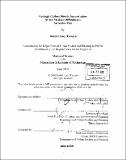Geologic carbon dioxide sequestration from the Mexican oil industry : an action plan
Author(s)
Lacy, Rodolfo
DownloadFull printable version (4.724Mb)
Other Contributors
Massachusetts Institute of Technology. Dept. of Urban Studies and Planning.
Advisor
Lawrence Susskind.
Terms of use
Metadata
Show full item recordAbstract
Climate change has become an important focus of international environmental negotiations. In response, global energy corporations have been looking for practical ways of reducing their industrial carbon dioxide (CO₂) emissions. Capturing massive quantities of CO₂ from flue gases (at large stationary sources) and storing them in geologic formations is a technically feasible and ecologically convenient way to close the "fossil fuel life cycle." CO₂ can be injected into mature oil reservoirs to enhance their productivity at the same time as it is being stored. Indeed, carbon capture and storage (CCS) technologies - combined with enhanced oil recovery operations (EOR) - offer a very attractive strategy for mitigating the adverse global impacts of energy production. The potential of this strategy may be crucial to the future development of the oil and electricity industries in signatory countries to the United Nations Framework Convention on Climate Change (UNFCCC). These signatories and their major corporations have research initiatives underway to deploy and test CCS-EOR. If these projects are successful, they will make it easier to achieve compliance with Kyoto Protocol emissions target and provide an impetus for the Clean Development Mechanism (part of the Kyoto Protocol) to support CCS. Mexico, one of the leading oil producers and consumers in the developing world, is not yet participating fully in these initiatives, despite the commercial, economic, and environmental advantages they appear to offer. (cont.) The main purpose of this thesis is to describe the industrial limitations, financial constraints, and institutional barriers, at both the national and international levels, that appear to inhibit Mexico's participation in CCS initiatives and to suggest ways of overcoming them. I look particularly at one of Mexico's most productive but rapidly depleting oil reservoirs: Cantarell. My analysis of this case suggests that it would be quite desirable to include CCS- EOR as part of' Mexico's efforts to meet its Kyoto Protocol objectives while at the same time enhancing the profitability of the Mexican energy sector.
Description
Thesis (S.M.)--Massachusetts Institute of Technology, Dept. of Urban Studies and Planning, 2005. Includes bibliographical references (p. 83-86).
Date issued
2005Department
Massachusetts Institute of Technology. Department of Urban Studies and PlanningPublisher
Massachusetts Institute of Technology
Keywords
Urban Studies and Planning.